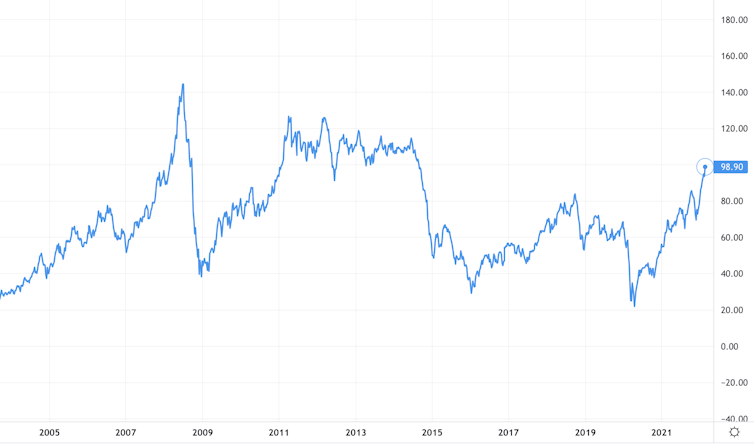'I'm surprised the oil price hasn't hit US$130 a barrel yet' – energy trading expert Q&A
- Written by Adi Imsirovic, Senior Research Fellow, Oxford Institute for Energy Studies, University of Surrey

Energy prices shot up after Russian President Vladimir Putin shocked the world by ordering a full-scale invasion of Ukraine. Oil is trading over US$100 (£75) a barrel for the first time since 2014 and natural gas prices jumped back towards the highs of late last year, although both eased a little the day after the invasion.
With consumers and businesses already struggling with high inflation everywhere from fuel pumps to power bills, and the world economy facing an uncertain recovery from the COVID pandemic, we asked Adi Imsirovic, a Senior Research Fellow at the Oxford Institute for Energy Studies and former oil trader, for his take on what happens next.
How was the energy market before the invasion?
Prices were already high because the market is very tight right now. The countries in the Opec+ world oil cartel couldn’t even produce enough oil to meet their quotas, and this wasn’t necessarily deliberate. We had an almost unexpectedly good rebound in demand after COVID, which created a lot of pent up demand. The key was probably all the economic stimulus from governments[1] and central banks[2].
How important is Russia to the global oil and gas market?
It’s one of the biggest oil producers in the world, producing over 10 million barrels[3] of oil and condensate each day, of which about 7.5 million, including refined oil products, are exported. Crude oil exports are about 4.5 million barrels, of which at least two-thirds goes west, mainly to Europe. The remainder of Russian oil exports are products like diesel, petrol or naptha, and again much of that goes to the west. In all, Russia satisfies around a tenth[4] of world oil demand, so it’s huge.
For natural gas[5], Russia is second only to the US, producing some 1.7 billion cubic metres each day compared to 2.5 billion from the US. Overall, in terms of Russia’s energy revenues, about four-fifths comes from oil and the rest from gas. About 40%[6] of Europe’s gas imports come from Russia.
How do you think Russian oil and gas exports will be affected by the war?
The severity of this attack and impact on global politics is such that I can’t see any sanctions working unless they include energy restrictions, and denying Russia access to the international Swift system[7] which handles payments between banks.
Russia’s oil, [known as Urals oil], normally trades at a discount of about US$1-US$1.50 per barrel to North Sea Brent crude, but this has currently widened substantially to about US$10[8] because people are worried that there may be issues with payments. At the same time, shipping owners are avoiding Russian ports, freight rates involving Russia have gone up, and so have insurance rates for consignments. With around two thirds of Russian crude and products moving by ships rather than pipes, this means it’s only a matter of time before you may start to lose Russian oil from the market.
Brent crude price (US$/barrel)







